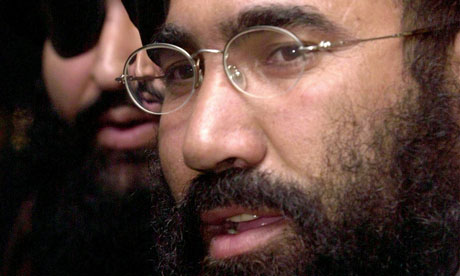Raids on ex-Taliban threaten Afghan peace process, diplomats warn
Security forces target homes of former regime members who have played a vital role in pushing peace talks with insurgents
- guardian.co.uk,
- Article history

Mullah Zaeef, former Taliban ambassador to Islamabad, is one of the leading proponents of Afghan peace talks. Photograph: Tariq Aziz/AP
International and Afghan security forces are setting back the embryonic peace process by raiding the homes of former Taliban officials instrumental in promoting talks with insurgents, according to diplomats and leaders of the former hardline regime.
At a time when the US has called for a "diplomatic surge" to solve the conflict, the most recent target of the greatly expanded night raids programme, which employs electronic eavesdropping and special forces units on a major scale, was Mullah Zaeef, former Taliban ambassador to Islamabad and a proponent of peace talks. He is regarded as sufficiently important by the international community that last year an international travel ban on him was lifted, so he could visit London for talks with British officials.
Just over three weeks ago, a mixed force of foreign troops and agents from Afghanistan's National Directorate of Security attempted to enter his house late at night. Zaeef was not present, but there was an armed standoff between the raiding party and his guards, who also work for the directorate.
The raid was called off after what Hamid Karzai's spokesman described as "interventions by the government leadership". Abdul Hakim Mujahed, a former Taliban envoy to the UN, said security forces had been tracking a target who had gone into Zaeef's house; he complained the government of Hamid Karzai was "too weak" to stop such operations.
The incident is one of several where former high-ranking Taliban involved in reaching out to current insurgents in order to "reintegrate" them into peaceful life have had their houses raided, or attempts have been made to raid them.
"We get phoned up by HPC [High Peace Council] members all the time, complaining that their house has just been raided," said Mujahed. The HPC, set up by Karzai to foster peace talks, includes many former Taliban officials.
Mujahed said western military officers and diplomats were failing to co-ordinate their efforts: "It's really unhelpful, but we have these different sets of players that are really bad at talking to each other."
An official for Nato's International Security Assistance Force (Isaf) in Kabul said a "reintegration event" had been taking place at Zaeef's house at the time, and that the security forces would not have interfered had they known about it. He also said Isaf soldiers had been present only to support a directorate-led operation.
The Taliban's former commerce minister, Abdul Razak, also a member of the HPC, said such raids were hugely damaging to efforts to bring peace because they sowed distrust among insurgents considering an end to violence.
"They say to us: look, you are with the government now but you can't even stop your houses being raided. Why should we come for peace, too?" he said.
Razak said he was himself had been the subject of a raid, last May, when he was entertaining some of his fellow former Guantánamo Bay detainees for lunch.
A team of US soldiers tied up the men and held the women and children at gunpoint as they searched "every last thing" in the house, he said.
In November Isaf troops and directorate agents made an aborted night raid on Arsala Rahmani, a former Taliban education minister who sits in Afghanistan's upper parliament.
Rahmani emphasised the importance of being able to meet people freely. "Everyone is coming to us – people who don't like the government, people with peace plans," Rahmani said.
Rahmani and others have long argued that the Taliban should be allowed to set up an office outside the country, with Turkey often suggested as a location, where they could meet representatives from all sides of the conflict without fear of being arrested.
Karzai's spokesman suggested the Isaf was not solely to blame for the mistaken raids, saying the government had told "both our international partners and our security forces" that the private homes of former Taliban living in peace must "be immune from intrusion".
An Isaf spokesman said the international force "fully supports the Afghan government's reintegration and reconciliation efforts", but those efforts were complicated by the huge increase in the number of Isaf operations to kill and capture insurgent leaders.
"All of these targeted operations are co-ordinated with the Afghan security forces, and all of them have Afghan security force involvement," he said. "We share our intelligence and will adjust our operations focus based on input and feedback from our Afghan partners."
Michael Semple, a former diplomat closely involved in reconciliation issues, said there were a number of possible explanations for the aborted raid on Zaeef's house, including that his enemies may have fed false intelligence to security, and the enthusiasm of US counter-terrorism (CT) forces.
"As long as there is a terrorist threat, Afghan false reports and CT forces in the field, this kind of thing will happen," he said.
No comments:
Post a Comment